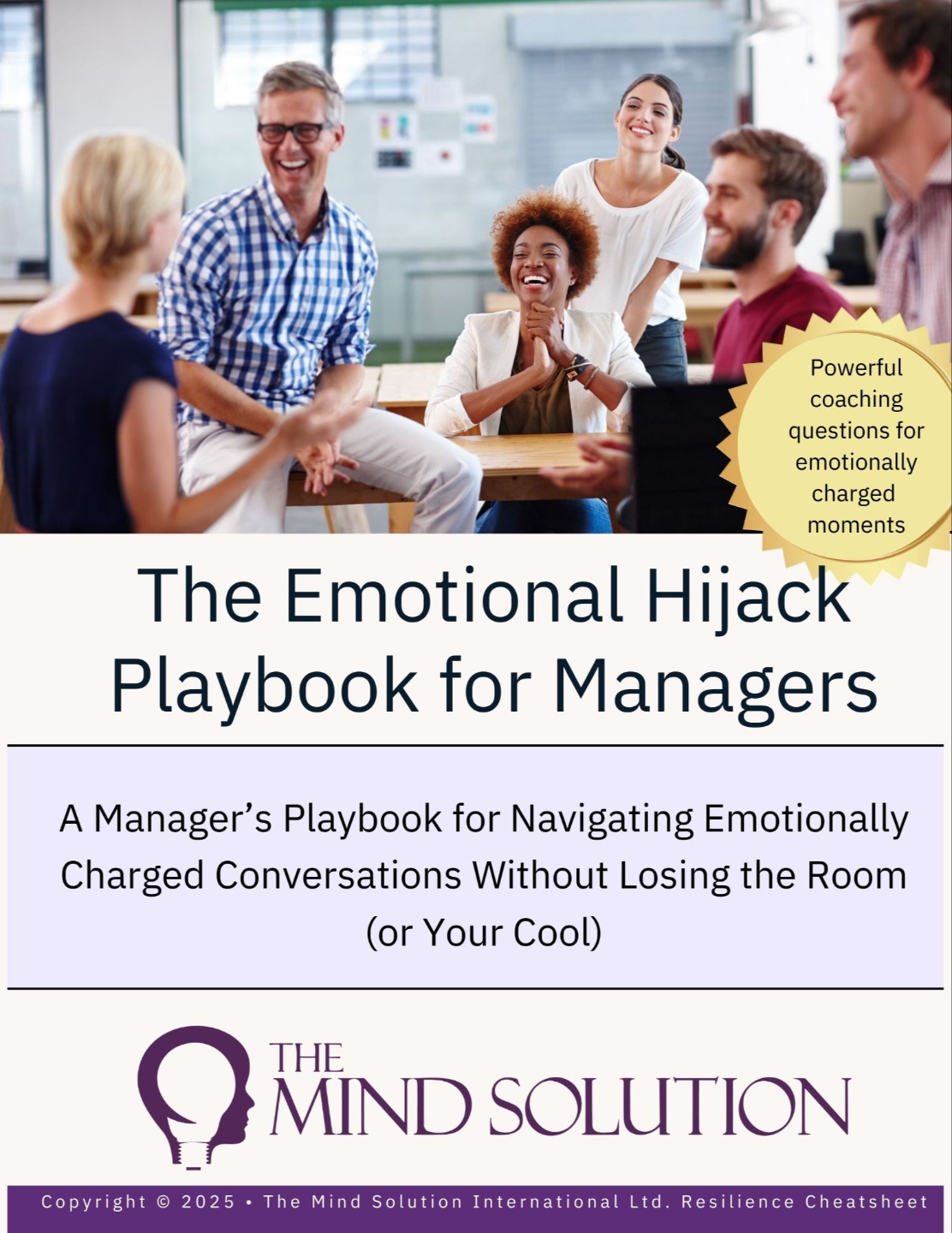Mental Health at Work: Who’s Really Responsible?
Sep 03, 2025
Mental Health at Work Commitment: Where Does Accountability End?
Recently, I spoke to an organisation whose absence at work problem is costing them over £100,000 a week.
They’re a UK company of around 1,500 people. And in one particular sector of the workforce, which accounts for about half the employees, the absence rate is sitting at 10.9%.
In the HR Director’s own words, the situation is “hellish.”
This isn’t a case of an organisation doing nothing. Quite the opposite.
They’ve been doing everything they know how to do to reduce absence, from invoking formal attendance procedures to implementing disciplinary measures, and even dismissals.
And yet… the figures won’t shift.
And the organisation is haemorrhaging money.
But it’s not just a financial strain.
It’s a moral and cultural tension, too.
“We don’t want to create a culture of punishment,” the HR Director told me. “This isn’t the kind of workplace we want to be.”
Not only is replacing staff in these particular roles costly, but it’s also the last thing they want to be doing from a people perspective. And so the real question became:
“What’s actually going on — and how do we turn it around?”
Mental Health at Work Commitment: A Framework or a Wellbeing Solution?
Many organisations now sign up to the Mental Health at Work Commitment, a framework based on the government-backed Thriving at Work standards.
It outlines six core standards for employers to follow:
-
Prioritise mental health
-
Drive positive mental health outcomes
-
Promote an open culture
-
Increase organisational capability
-
Provide tools and support
-
Increase transparency and accountability
It’s a good framework.
It encourages visibility. It signals intent.
It helps organisations begin to put structure and commitment around mental health.
But what it doesn’t answer, and what the organisation I spoke with is now asking, is:
Who is resonsible for mental health health?
I'd like to say that the answer is a straightforward one. Yet as I outline below, the answer has got several layers and nuances to it.
Managing Mental Health at Work: The Practical Reality
In this particular organisation, 24% of reported absence was related to musculoskeletal issues, and another 24% was due to mental health problems.
Now, like most companies trying to do the right thing, they’ve got what many would consider to be the “basics” in place:
-
Mental Health First Aiders
-
Occupational Health
-
Employee Assistance Programme (EAP)
-
Access to physiotherapy
-
Counselling via OH referral
These are all good things. And yet, absence due to mental and physical health issues remains stubbornly high.
So the question becomes:
If the resources are in place… why isn’t anything changing?
Mental Health at Work Resources: Fit for Purpose or Just in Place?
One case shared by the HR Director involved an employee who had recently experienced a bereavement.
They were told it would take four months to access a bereavement counsellor through the NHS.
So the organisation stepped in and paid privately.
At first glance, this might seem like a great example of a company going above and beyond.
But I couldn’t help asking myself:
-
Why wasn’t the EAP used?
-
If it was, why wasn’t it suitable for bereavement support?
-
And here’s the really sticky question — did the organisation have to pay?
Now, I know that might sound controversial, especially as someone who has worked as a private therapist for 13 years. So let me explain my train of thought.
That particular individual was on a salary of around £70,000 a year.
A bereavement counsellor in the UK? Anywhere from £40 to £60 per hour.
So I couldn’t help wondering why the individual hadn't sought to pay for the bereavement counselling themselves?
How to Support Mental Health at Work: The Uncomfortable Truth
This is where it gets complex. Because the truth is, and I’ll say it plainly, not everyone knows what they’re responsible for.
We’ve created a workplace culture where people are starting to expect external support, without ever being invited to consider their own responsibility for mental health and wellbeing.
Over the years, I’ve worked privately with individuals at all levels of organisations:
-
Board-level directors
-
Heads of departments
-
First-time managers
-
Junior team members
And what they’ve all had in common is this:
They made the decision to invest in their own mental health.
They didn’t wait for permission.
They didn’t expect someone else to foot the bill.
They said, “I’m not okay, and I want something that works.”
And I’ll tell you this, the people who come to me aren’t looking for talking therapy.
They’ve done that. They’ve usually got access to that through private medical or their EAP.
They come because they want something transformational.
They want results. They want clarity. They want healing.
And they’re willing to take radical responsibility for getting it.
Mental Health at Work Training
When it comes to The Mental Health at Work Commitment, I’ve seen organisations invest thousands in mental health and wellbeing.
Employee Wellbeing Webinars. Mental health apps. Toolkits. Mental Health Platforms. Mental Health Wellbeing Initiatives.
And yet, in many cases, the uptake is minimal.
I’ve worked with companies with 10,000+ employees, and the percentage of people actually engaging with the resources is astonishingly low.
Even when support is available, people don’t always use it.
Why again, begs the question, who is responsible for mental health?
Sadly, when it comes to wellbeing in the workplace, we assume that by offering a tool, people will use it. What we don't take into account is that for people to take full responsibility for their mental health, they often have to create change, and change and people don't go hand in hand, as I explain in this video.
Mental Health at Work Initiative: Why Education Is Just as Important as Intervention
One of the biggest insights I’ve had from working in the field of mental health and wellbeing is...
People don’t always know what’s available — or what’s possible.
Even in today’s landscape, most people’s first port of call is still the GP.
And the NHS, as vital as it is, is not built to support the day-to-day emotional demands of work.
I’ve even met with the Deputy Minister for Mental Health in Scotland to talk about the lack of effective, scalable intervention. And to be honest, he was about as useful as a chocolate teapot.
So many employees are struggling, on long waiting lists, not because they’re unwilling, but because they’ve never been shown another way.
And that’s why education is vital.
A great example of this is a Marketing Director who attended one of our Managing Mental Health Training Courses I'd run at her organisation. She contacted me following the training and asked if I could help her with her fear of public speaking. She had already tried CBT Therapy, and an Executive Coach (who'd told her to just 'imagine people naked' - seriously) and had concluded that she'd have to try and manage her fear as best she could.
That was until I helped her see a different way. During the training, I'd mentioned Hypnotherapy and EFT Tapping, and without realising it, I'd planted a seed in her mind.
Fast forward, and her fear of public speaking has vanished, and she's thriving in her newfound confidence and leadership abilities.
Why I Still Teach EFT — And Why It Changes Lives
As I've highlighted, people don't know what they don't know. Take EFT Tapping as a great example. EFT has been around for around 40 years (and has been featured on Oprah!), but in the UK it's far less well known than in other countries, such as Australia, where they are now using it in schools and prisons.
One of the reasons I still love teaching EFT (Emotional Freedom Technique) in the workplace is because of how empowering it is. Within minutes, employees experience a shift in their mind and body that literally blows their mind!
EFT is an incredible resource to teach employees because it's
-
Fast - Cortisol levels can be lowered within minutes
-
Empowering - Employees can change how they feel in minutes
-
Easy to learn - Children as young as 5 can learn how to use EFT
-
Shockingly effective - This isn't about managing emotions, EFT Tapping can be used to completely overcome mental health conditions - I have HUNDREDS of case studies!
EFT Tapping gives people a way to regulate, reflect, and reset their emotions and nervous system in real time.
No appointment needed. No six-week waiting list. No “go talk to your GP.”
It’s one of the most practical and powerful tools I’ve seen for reducing anxiety, dealing with emotional overwhelm, and restoring mental clarity.
And I’ve used it myself, personally and professionally, for over a decade.
Because when someone knows they have a tool that works, that’s when ownership starts to grow.
So… Who’s Responsible for Mental Health at Work?
Here’s the part no one wants to say out loud:
Ultimately, the only person who can take responsibility for your mental health… is you.
That’s not to say organisations shouldn’t support.
They should. They must.
But support only works if it’s met with willingness.
It only lands if the individual says yes.
You can sign all the commitments in the world.
You can offer all the resources, funding, frameworks, and training.
But if someone doesn’t engage, it’s meaningless.
And let’s be honest: this is not a straightforward conversation.
There are structural barriers.
There are cultural taboos.
There are psychological blind spots.
Which is exactly why this isn't a one-size-fits-all approach.
Final Thoughts: Empowerment Over Entitlement
Organisations have come a long way.
I’ve seen the shift.
I’ve felt the intention.
But intention without education doesn’t go far.
And support without self-responsibility doesn’t stick.
If we really want to change things — not just tick boxes — we have to stop pretending that this is simple.
Because it’s not.
Some people aren’t accessing support because they don’t know it exists.
Others because they don’t think they deserve it.
And some because they don’t know it’s their job to reach for it.
We need to have these conversations — even if they’re uncomfortable.
Because that’s how change actually happens.
So where does accountability for mental health at work end?
It doesn’t.
It’s not a line. It’s a loop.
A shared responsibility.
An ongoing conversation.
That's why when it comes to helping you create the right employee wellbeing culture, we will dig deep to find out exactly what's what and provide you with a solution that gives you a return on investment. Because it's not just about signing pledges.
Need some help to craft the right wellbeing support for your people? Contact us today and let's work together to create the right impact.
The Emotional Hijack Playbook For Managers
A Manager’s Free Resource for Navigating Emotionally Charged Conversations Without Losing the Room (or Your Cool).
Perfect to use in your next one-to-one.







